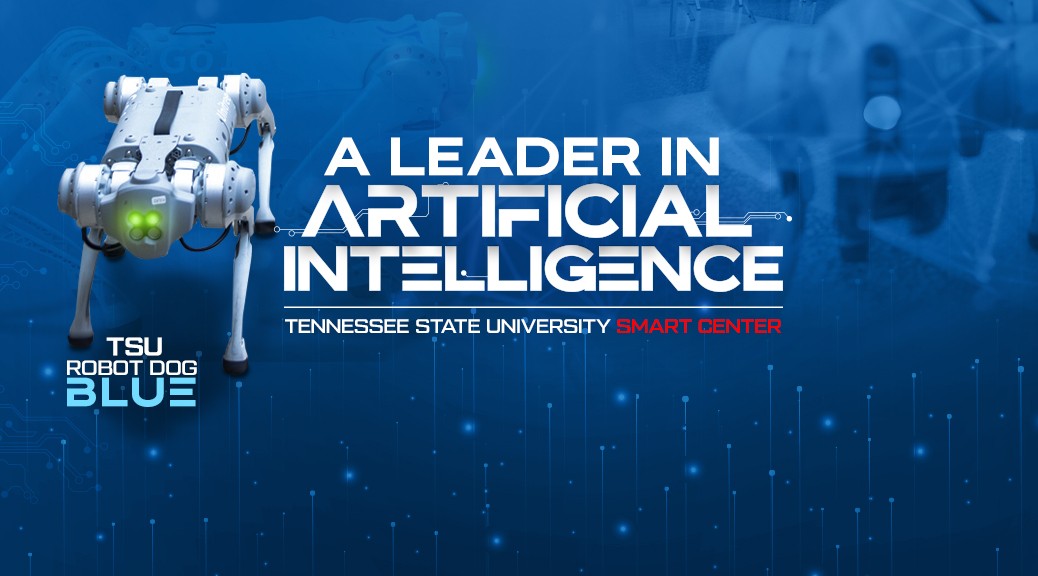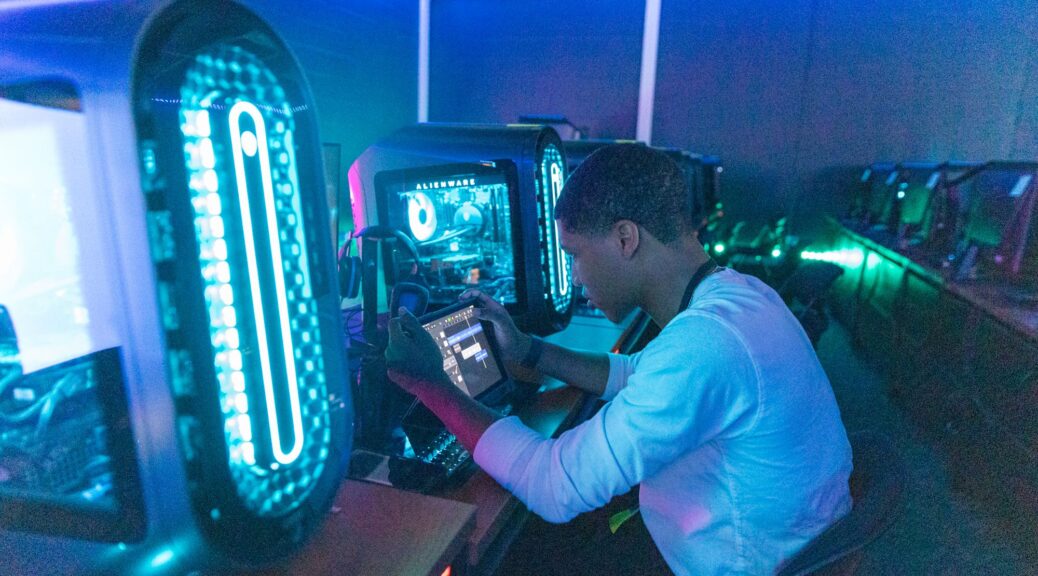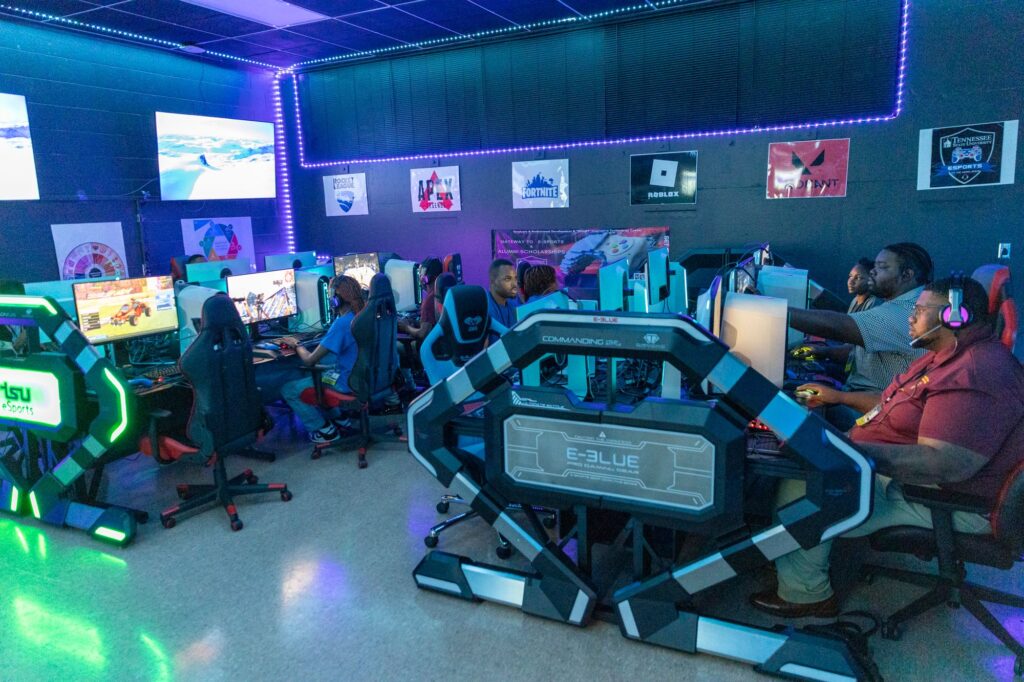NASHVILLE, Tenn. (TSU News Service) – Tennessee State University is bringing artificial intelligence to the masses. Starting June 5, 2024, the university will host the A.I. FOR ALL: Open Education Summit , at the Avon Williams Educational Site. The two-day technology event will explore the heart of innovation, with the goal of show casing how artificial intelligence is within reach for everyone.

During the opening session, TSUs AI robotic dog Blue and his pup greeted the crowd. The AI dogs will be making appearances throughout the summit.
Some of the topics will include Ethics and Policies for A.I., A.I. Tools for Every Stage of Education, A.I. for Educational Equity, and Innovating Pedagogy with A.I. The summit will include industry giants Google, Apple, Oracle, T-Mobile, Comcast, Amazon, and Microsoft. National speakers, panels, interactive workshops, A.I. exhibits, plus art galleries and tools will also be on display. Prominent sponsors and partners include the William and Flora Hewlett Foundation, T-Mobile Education, Merlot- Affordable Learning Solutions, and MIT-Open CourseWare. The summit is free and open to the public.
Dr. Robbie Melton, who is the Interim Provost and Vice President for Academic Affairs, also serves as the Vice President for Technology Innovations and heads the TSU SMART Global Technology Innovation Center. Recently, she was appointed to the Southern Regional Education Board Commission (SREB) on Artificial Intelligence in Education. Melton’s appointment further solidifies her status as a top expert and TSU as a leading institution on artificial intelligence.

“My passion lies in making A.I. accessible to everyone, amplifying voices that are often unheard, and breaking down the barriers that divide us,” added TSU’s Melton. “Together, we can shape a future where A.I. isn’t just a tool for the few, but a force for good that enriches all of our lives.”
Over 500 people are expected to attend the summit. Dr. Melton discusses the groundbreaking summit in detail below in our Q&A interview.
Q & A with Dr. Robbie Melton
Subject: A.I. For All: Open Education Summit
What does hosting the A.I. For All Summit mean for TSU?
“Hosting the A.I. For All Summit brings visibility, reputation, and networking opportunities to TSU. It enhances the institution’s standing as a leading A.I. authority, fosters collaborations, and attracts top talent. The event facilitates knowledge exchange, showcasing TSU’s research while learning from others. The summit’s economic impact benefits local businesses and generates revenue through sponsorships. TSU assumes a leadership role, influencing A.I. policy, ethics, and research. Overall, hosting the summit brings recognition, collaboration, talent, economic benefits, and the chance to shape the A.I. landscape.”
With that question answered, what do you hope to accomplish from hosting this technology event?
“The proposed outcomes and accomplishments for the A.I. For All Summit are threefold. Firstly, to foster collaboration and knowledge exchange among experts, researchers, and policymakers, leading to innovative solutions and advancements in the field of artificial intelligence. Secondly, to inspire and empower students and young professionals by providing them with access to cutting-edge research, industry insights, and networking opportunities. Lastly, to shape the discourse on A.I. policies, ethics, and research priorities, influencing the global A.I. landscape and promoting responsible and inclusive development.”
What demographic or group has registered for the summit?
“The registered attendees for the A.I. For All Summit include educators from K-12 and higher education, policymakers, and community leaders, especially from minority serving institutions since the summit is to address A.I. for All.”
How will the summit benefit the State of TN, underserved communities, education?
“The A.I. For All Summit benefits the state of Tennessee by driving economic growth, providing educational opportunities, identifying guardrails and best practices for teaching and learning, preparing for the A.I. workforce, fostering collaborations, empowering underserved communities, shaping policies, and inspiring future innovators in the field of artificial intelligence.”
The title is A.I. for all, how does a regular, non-tech savvy individual benefit from the summit?
“The A.I. For All Summit benefits regular, non-tech savvy individuals by promoting awareness and understanding of artificial intelligence’s impact on society. It provides insights into ethical considerations, potential opportunities, challenges, and offers the opportunity to learn how to use A.I. tools, empowering individuals to engage with and leverage A.I. technologies, even without technical expertise.”
There are some big tech names associated with the summit; who are they and what are their roles?
“The A.I. For All Summit is supported by notable tech names such as Hewlett, Oracle, Microsoft, T-Mobile, Comcast, Code.org, BrainPOP, Adobe, SendSteps, and MIT. They play various roles, including providing resources, expertise, sponsorship, and collaboration to drive the success of the summit and advance the field of artificial intelligence.”
How significant is this for TSU?
“The A.I. For All Summit is a significant event for TSU, with its high attendance of over 500 participants and a waiting list. The global live streaming amplifies its reach and impact, positioning TSU as a leader in fostering A.I. education, collaboration, and innovation on a global scale.”
Will Blue be a part of the summit and other interactive displays and demonstrations can attendees expect?
“The A.I. For All Summit will feature Blue, the robotic A.I.-coded dog, highlighting the transformative capabilities of A.I. in education and business. Additionally, attendees can experience groundbreaking technologies like life-sized holograms, the first A.I. wearable Pin and glasses, and A.I. tools spanning various educational and business disciplines.”
Special Announcement for the A.I. for All Summit:
“We are thrilled to announce the upcoming launch of the TSU A.I. Applied Educational Research Center under our SMART Technology Innovation Center, in August 2024. This pioneering initiative aims to curate cutting-edge A.I. tools and best practices for teaching, learning, research, and workforce preparedness. With a specific focus on addressing underrepresented groups, the center will drive inclusivity and equity in A.I. education. By harnessing the power of A.I., we strive to empower learners, educators, and researchers with transformative resources, fostering innovation and bridging the digital divide. Join us in shaping a future where A.I. transforms education for all.”




